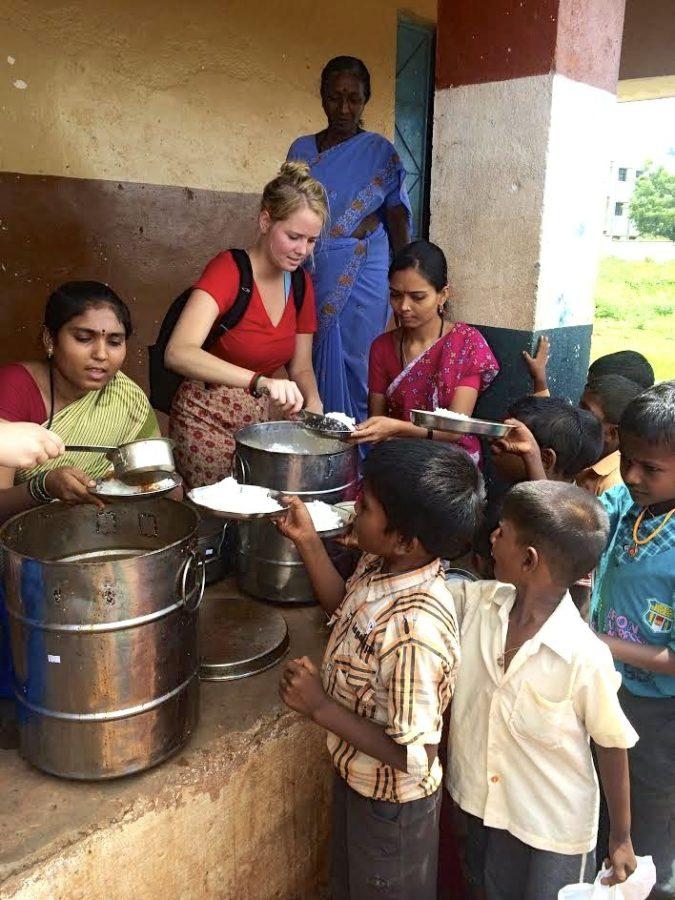ISU student joins fight against poverty, hunger, social injustice
July 16, 2015
Ella Gehrke wants to make a difference in global and women’s health.
Gehrke, junior in global resource systems, will attend training at the end of July in Boston from the Oxfam Change Initiative. Oxfam originated from the Oxford Committee for Famine Relief.
The Oxfam program aims to equip students with the tools needed to encourage people on campus or in their community to get involved and make a change to better the world and to fight against poverty, hunger and injustice.
“The Oxfam Change Initiative is a program where university students get together and have the chance to take critical issues facing the globe and to bring them into… action on their campuses and in their home communities,” said Gail Nonnecke, Morrill professor and global professor in Global Resource Systems.
Gehrke said the Oxfam program focuses on social injustices and empowering groups of people who have been victims of social injustice.
This isn’t Gehrke’s first step in world change. The junior at Iowa State has visited countries in the developing world on several occasions.
When she was 16, Gehrke went to El Salvador for the first time. The experience was eye-opening and showed her what poverty actually looked like, she said.
Her trip to El Salvador inspired her passion for helping people and working to improve women’s health in developing countries.
Gehrke also went to India last summer to work in a rural village, where they were allowed to craft their own projects based on the problems they were seeing.
“It was a remarkable experience because we had the opportunity to work in a very rural village with a lot of women,” Gehrke said. “We had to go in and figure out what some of the problems we’re seeing are and how we [could] teach the people how they can make lifestyle changes to better their community and their families.”
Gehrke is part of the Global Resource Systems program at Iowa State. Nonnecke said the program is about studying all of the world’s resources and how they are connected in systems.
“The global resources range from natural resources like soil and water and climate through the socio-economic resources such as education and… cultures,” Nonnecke said. “Food and agriculture, of course, are very important on global resource systems because that’s what allows humans to live and prosper.”
Gehrke competed alongside four students in the Thought For Food challenge, a competition for students to come up with solutions for feeding the world’s global population, she said.
“We competed against around 350 teams and we made it to the top 10, so we were able to present our idea at a Syngenta conference… and we got to travel to Lisbon, Portugal for around two weeks,” Gehrke said.
The solution presented by the team was the KinoSol, a solar food dehydrator, which aims to preserve food and create mobility for farmers to encourage trade.
“Dehydrating extends the shelf life of the fruit and allows the nutrients to be consumed year round,” Gehrke said. “We are targeting these toward non-governmental organizations, or churches that already have established roots.
“We did some research and we know that there’s huge micronutrient deficiencies. So there’s hunger, but there’s also hidden hunger, where people just don’t have enough nutrients in their diet and that causes a lot of health issues, like anemia and issues with pregnancy.”
The team has two units in Uganda and plans to expand to South Sudan and El Salvador within the next few months, she said.
“I’ve been learning about all these issues and learning about global development and then we actually are doing something. It’s a really rewarding experience,” Gehrke said. “We had some feedback from some of the women who are saying that they’re excited to use our product and that they want to incorporate them in their own households. That validation is warming to the soul.”
Gehrke plans to come back after her Oxfam training and host events at Iowa State to engage people on campus about the issues Oxfam wants students involved in, she said.
“One of the reasons I’m excited about this Oxfam experience is because I think there’s a lot of Iowa State students who already care about these issues,” Gehrke said. “We actually can make a change.”
Gehrke hopes to attend medical school after her time at Iowa State. She also said she plans to focus on international medicine in women’s health.
“I think with an actual skill, you are able to do a lot more work in those regions,” Gehrke said.







